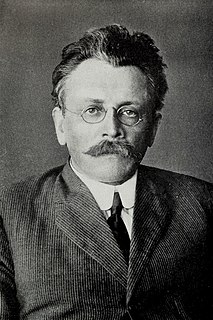A Quote by Abraham Cahan
If a man is tongue-tied, don't laugh at him, but, rather, feel pity for him, as you would for a man with broken legs.
Related Quotes
A good laugh is a mighty good thing, and rather too scarce a good thing; the more's the pity. So, if any one man, in his own proper person, afford stuff for a good joke to anybody, let him not be backward, but let him cheerfully allow himself to spend and be spent in that way. And the man that has anything bountifully laughable about him, be sure there is more in that man than you perhaps think for.
If you work for a man, in heavens name work for him! If he pays you wages that supply you your bread and butter, work for him speak well of him, think well of him, stand by him and stand by the institution he represents. I think if I worked for a man I would work for him. I would not work for him a part of the time, and the rest of the time work against him. I would give an undivided service or none. If put to the pinch, an ounce of loyalty is worth a pound of cleverness.
It´s a good thing when a man is different from your image of him. Is shows he isn´t a type. If he were, it would be the end of him as a man. But if you can´t place him in a category, it means that at least a part of him is what a human being ought to be. He has risen above himself, he has a grain of immortality.
A guide, on finding a man who has lost his way, brings him back to the right path—he does not mock and jeer at him and then take himself off. You also must show the unlearned man the truth, and you will see that he will follow. But so long as you do not show it him, you should not mock, but rather feel your own incapacity.
You need not fear me, for I not only should think it wrong to marry a man that was deficient in sense or in principle, but I should never be tempted to do it; for I could not like him, if he were ever so handsome, and ever so charming, in other respects; I should hate him—despise him—pity him—anything but love him. My affections not only ought to be founded on approbation, but they will and must be so: for, without approving, I cannot love. It is needless to say, I ought to be able to respect and honour the man I marry, as well as love him, for I cannot love him without.
Nature has placed in the front part of man, as he moves, all those parts which when struck cause him to feel pain; and this is felt in the joints of the legs, the forehead and the nose, and has been so devised for the preservation of man, because if such pain were not felt in these limbs they would be destroyed by the many blows they receive.
The spiritual man habitually makes eternity-judgments instead of time-judgments. By faith he rises above the tug of earth and the flow of time and learns to think and feel as one who has already left the world and gone to join the innumerable company of angels and the general assembly and Church of the First-born which are written in heaven. Such a man would rather be useful than famous and would rather serve than be served. And all this must be by the operation of the Holy Spirit within him. No man can become spiritual by himself. Only the free Spirit can make a man spiritual.
If, therefore, man has come into the world to search for God and, if he has found Him, to adhere to Him and to find repose in adhering to Him-man cannot search for Him and attain Him in this sensible and corporeal world, since God is spirit rather than body, and cannot be attained in intellectual abstraction, since one is able to conceive nothing similar to God, as he asserts-how can one, therefore, search for Him in order to find Him?
A rationalist, as I use the word, is a man who attempts to reach decisions by argument and perhaps, in certain cases, by compromise, rather than by violence. He is a man who would rather be unsuccessful in convincing another man by argument than successful in crushing him by force, by intimidation and threats, or even by persuasive propaganda.







































